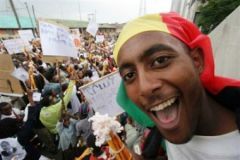Ethiopian ruling party wins disputed elections
ADDIS ABABA, Aug 9 (AFP) — Ethiopia’s ruling party won disputed May elections and will form a new government, the national election board said Tuesday, ending a nearly three-month ordeal of uncertainty punctuated by deadly violence.

|
|
Supporters of Ethiopia’s ruling party the People’s Revolutionary Democratic Front hold a rally,Thursday, May 12, 2005 in the capital, Addis Ababa to express their support for fair and peaceful elections. (AP). |
The party of Prime Minister Meles Zenawi, which has been in power since toppling a Soviet-backed communist regime in 1991, won an absolute majority in the 547-seat parliament in the May 15 polls, the board said, issuing long-delayed final returns.
“According to official results, the Ethiopian People’s Revolutionary Democratic Front (EPRDF) has won 296 seats that would enable it to form the federal government,” it said in a statement.
The two main opposition groups in the Horn of Africa country, the Coalition for Unity and Democracy (CUD) and the United Ethiopian Democratic Forces (UEDF), which have complained of widespread ballot fraud, won 109 and 52 seats respectively, the board said.
When combined with victories by allied parties, the EPRDF will control a total of 318 seats in parliament and the oppposition 174, according to the National Electoral Board of Ethiopia (NEBE).
The results issued by the board, however, were immediately rejected by the UEDF, which said it would challenge them in court.
Party vice president Beyene Petros said the returns were flawed and the result of a conspiracy between the national election board and the ruling party to ignore opposition allegations of widespread fraud in the May 15 polls.
The election board “has failed to do its job,” he told AFP, vowing to mount a court challenge.
The results issued Tuesday cover only 492 of the 524 constituencies that were contested on May 15 but give the EPRDF and its allies an unbeatable lead in parliament.
The announcement ended months of uncertainty over the results during which protests over alleged fraud erupted into deadly clashes in the capital and elsewhere and prompted a massive police crackdown in which thousands were detained.
After preliminary results were released in late May and June showing an EPRDF victory, the opposition accused the ruling party of rigging the election and complained bitterly about harassment and intimidation of its supporters.
Protests against alleged electoral malfeasance turned violent, and up to 40 people were killed in Addis Ababa when police opened fire on crowds during demonstrations on June 8.
The authorities defended the police action as necessary to prevent hooligans from spreading anarchy in the country and rounded up more than 3,000 suspected troublemakers, many of whom were opposition members or supporters.
Despite a return to relative calm in the capital and the release of most of those detained in the weeks that followed, the opposition has not yielded in its claims of ruling party misconduct.
At the weekend, the CUD and UEDF proposed the formation of a national unity government with the EPRDF to oversee new elections.
The suggestion, which also appealed for international assistance in overcoming the political stalemate, was immediately dismissed by Ethiopian officials who said it was an attempt to subvert democracy by ignoring the will of the people.
NEBE chairman Kemal Bedri called on all Ethiopians to accept the verdict of the voters, noting that the board had made unprecedented efforts to probe the complaints and assure the public of its impartiality.
The board noted that re-elections in 32 constituencies where fraud and other irregularities had been proven would be held on August 21, the same day that voters in remote Somali state go to the polls for the first time to elect their 23 representatives under Ethiopia’s split election cycle.
Results from those 55 races are to be announced on September 5 but will make little difference to the makeup of parliament.
The UEDF’s Petros said the board’s rejection of the vast majority of opposition complaints without adequate explanation was proof that it had conspired with the EPRDF to certify a ruling party win.
After the violence, key foreign donors stepped in to urge calm and an end to the crisis and mediated an agreement between all sides for the quick resolution of electoral fraud complaints.
However, the international community, which had lauded the conduct of polling day itself, had grown increasingly impatient with delays in releasing the final results and had urged all sides to tone down their rhetoric.
More than 90 percent of Ethiopia’s 26 million registered voters turned out for the May 15 elections which were the country’s third since Meles’ EPRDF came to power, its second since the advent of multi-party politics and the first under international scrutiny.
